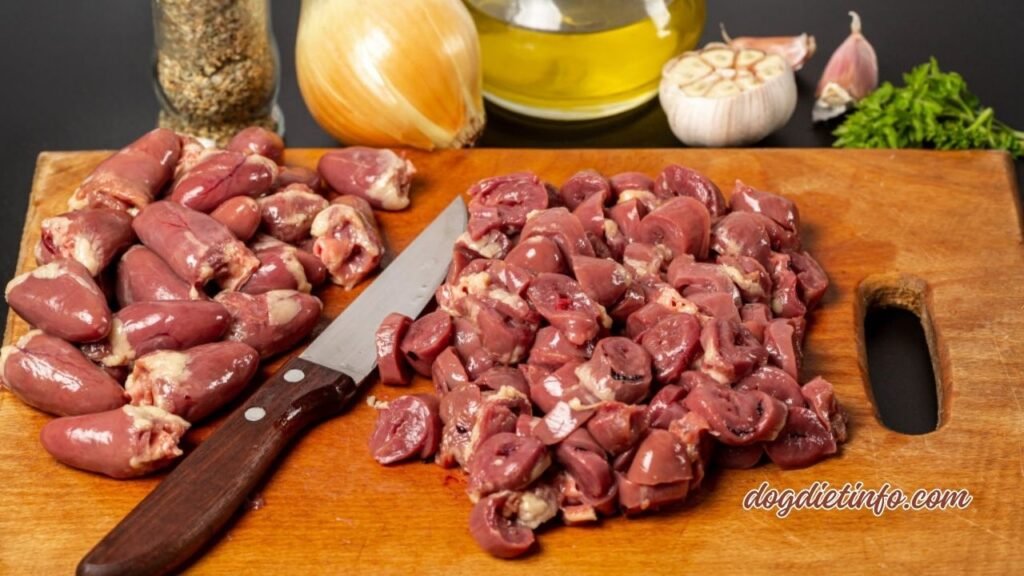Are Chicken Hearts Good For Dogs? Chicken hearts are generally considered good for dogs as they are rich in protein, taurine, and essential nutrients.
As pet owners, we are always on the lookout for the healthiest and most nutritious food options for our furry companions.
With an increasing trend toward natural and raw feeding practices, more dog owners are considering organ meats like chicken hearts as part of their pets’ diets.
But are chicken hearts good for dogs? In this comprehensive guide, we will explore the benefits, potential risks, preparation methods, and frequently asked questions regarding feeding chicken hearts to dogs.
Contents
What Are Chicken Hearts?
Chicken hearts are a type of organ meat, also known as “offal,” that comes from poultry. [Are Chicken Hearts Good For Dogs?]
These small, dense organs are packed with nutrients, making them a valuable component of a balanced diet, not just for humans but also for our pets.
Chicken hearts have been a staple in raw feeding practices for years and are highly regarded for their rich nutritional profile.
Description
Chicken hearts are typically dark red and about the size of a small grape. Unlike muscle meats such as chicken breast, chicken hearts fall under the category of “organ meats,” which include nutrient-dense parts like the liver, kidneys, and gizzards.
Due to their small size and high nutrient content, chicken hearts are often used in homemade dog food recipes, freeze-dried treats, and as part of raw feeding regimens.
Nutritional Content
The nutritional profile of chicken hearts is impressive. They are packed with high-quality protein, essential for muscle development and maintenance.
Besides protein, chicken hearts are rich in taurine, an amino acid crucial for maintaining heart health and eye function in dogs.
Additionally, chicken hearts contain vitamins A, B6, and B12, iron, zinc, phosphorus, and essential fatty acids like omega-3 and omega-6.
These nutrients collectively make chicken hearts a beneficial addition to a dog’s diet when fed appropriately. [Are Chicken Hearts Good For Dogs?]

Are Chicken Hearts Good For Dogs?
When fed in moderation and as part of a balanced diet, chicken hearts can offer numerous health benefits to dogs. Let’s explore these benefits in more detail:
Rich in Protein and Taurine
Protein is a fundamental component of any dog’s diet, as it supports muscle development, repair, and overall growth. [Are Chicken Hearts Good For Dogs?]
Chicken hearts are an excellent source of high-quality, lean protein, making them an ideal food option for active dogs, working breeds, and growing puppies.
Protein helps repair tissues, build muscles, and support various bodily functions, making it essential for a healthy, active dog.
Taurine is another critical nutrient found in chicken hearts. This amino acid is vital for maintaining a healthy heart, supporting eye function, and promoting overall well-being.
Taurine deficiency can lead to severe health issues, such as dilated cardiomyopathy (DCM) in dogs. Including taurine-rich foods like chicken hearts in your dog’s diet can help prevent such conditions and support cardiovascular health.
Source of Essential Vitamins and Minerals
Chicken hearts are a powerhouse of essential vitamins and minerals. Vitamin A, found in abundance in chicken hearts, is crucial for maintaining healthy vision, skin, and immune function.
B vitamins, particularly B6 and B12, play a significant role in energy metabolism, red blood cell formation, and nervous system health.
Minerals like iron and zinc are also present in chicken hearts, contributing to healthy oxygen transport, enzyme function, and immune system support.
Together, these nutrients help support various physiological functions and maintain overall health in dogs.
Promotes Healthy Skin and Coat
Omega fatty acids found in chicken hearts, particularly omega-3 and omega-6, play an essential role in maintaining a dog’s skin and coat health. [Are Chicken Hearts Good For Dogs?]
These fatty acids help reduce inflammation, promote a shiny coat, and keep the skin hydrated. Dogs prone to dry, flaky skin or dull coats can benefit from the inclusion of chicken hearts in their diet.
Additionally, omega-3s have anti-inflammatory properties that can help manage conditions like arthritis and allergies.
Boosts Energy Levels
The combination of high-quality protein, healthy fats, and essential nutrients in chicken hearts makes them a great source of energy for dogs.
Active dogs, working breeds, and dogs participating in sports or agility training can benefit from the energy boost that chicken hearts provide.
Including them as a part of the diet can help maintain optimal energy levels and support muscle recovery after vigorous activities.
Supports Joint Health
Chicken hearts contain collagen, a protein that is beneficial for joint health. [Are Chicken Hearts Good For Dogs?]
Collagen helps maintain the integrity of connective tissues, such as cartilage and tendons, which are vital for joint health and mobility.
Older dogs or breeds prone to joint issues may find additional support from foods rich in collagen.
Potential Risks of Feeding Chicken Hearts to Dogs
While chicken hearts offer many benefits, they also come with potential risks that pet owners need to be aware of:
Risk of Overfeeding
Feeding too many chicken hearts can lead to an imbalance in nutrients and potential health issues. While organ meats are nutrient-dense, they are also rich in fat, which can contribute to weight gain and obesity if fed in excess.
Overfeeding organ meats like chicken hearts can also lead to hypervitaminosis A, a condition resulting from excessive vitamin A intake. [Are Chicken Hearts Good For Dogs?]
Symptoms of hypervitaminosis A include lethargy, appetite loss, and bone deformities. Therefore, moderation is key when incorporating chicken hearts into a dog’s diet.
Raw vs. Cooked Chicken Hearts
There is an ongoing debate among pet owners and veterinarians about feeding raw versus cooked chicken hearts. [Are Chicken Hearts Good For Dogs?]
Raw feeding advocates argue that raw chicken hearts provide natural enzymes and nutrients that are often destroyed during cooking. However, raw chicken hearts can pose a risk of bacterial contamination, such as salmonella and E. coli, which can be harmful to both pets and humans.
On the other hand, cooking chicken hearts can significantly reduce the risk of bacterial contamination but may cause some nutrient loss.
The choice between raw and cooked chicken hearts ultimately depends on the owner’s preference and ability to source safe, high-quality meat.
Allergies and Sensitivities
While chicken is a common protein source for dogs, some dogs may develop allergies or sensitivities to chicken. Symptoms of food allergies can include gastrointestinal issues, skin irritations, and itching.
If you suspect your dog has a chicken allergy or sensitivity, consult with a veterinarian before adding chicken hearts to their diet.
How to Safely Feed Chicken Hearts to Dogs
To safely incorporate chicken hearts into your dog’s diet, it is essential to follow some guidelines:
Moderation is Key
Chicken hearts should be fed as a treat or supplement rather than a primary food source. The general recommendation is that treats and supplements should not exceed 10% of a dog’s daily caloric intake.
Portion sizes should be adjusted based on your dog’s size, age, and activity level. For instance, a small dog may only need one or two chicken hearts per week, while a large, active dog might benefit from a slightly larger portion.
Balanced Diet
While chicken hearts are rich in certain nutrients, they should be part of a balanced diet that includes other protein sources, vegetables, and, if appropriate, grains.
A balanced diet ensures that your dog receives all the essential nutrients required for optimal health. [Are Chicken Hearts Good For Dogs?]
You can incorporate chicken hearts into homemade dog food recipes or use them as a topping for high-quality commercial dog food.
Preparation Tips
Chicken hearts can be served in various forms, such as raw, boiled, or freeze-dried. If you choose to feed them raw, make sure to source them from a reputable supplier to minimize the risk of contamination.
Boiling or steaming chicken hearts is a safe alternative that still preserves most of the nutrients while eliminating harmful pathogens. Freeze-dried chicken hearts are another convenient and safe option with a long shelf life.
Serving Ideas
You can serve chicken hearts as a standalone treat or mix them into your dog’s regular meals. [Are Chicken Hearts Good For Dogs?]
They can also be chopped and added to homemade dog food recipes or served with other organ meats like liver and kidneys for a variety of nutrients.
When preparing chicken hearts at home, be sure to remove any excess fat and connective tissue to make them easier to digest.
Final Verdict
Chicken hearts can be a highly nutritious and tasty treat for dogs when fed in moderation. They provide essential nutrients like protein, taurine, vitamins, and minerals that contribute to a dog’s overall health.
However, it is crucial to balance their intake within a well-rounded diet and consult with a veterinarian to ensure it fits your dog’s specific needs. [Are Chicken Hearts Good For Dogs?]
Whether you choose to feed them raw or cooked, the key is to provide a safe, nutritious, and balanced diet that promotes your dog’s health and well-being.
See Also: Is Bacon Grease Good For Dogs?
FAQs
Can Puppies Eat Chicken Hearts?
Yes, puppies can eat chicken hearts in moderation as part of a balanced diet. However, it is crucial to introduce them slowly and in small amounts. Consult with a veterinarian to determine the appropriate portion size and frequency.
Are Chicken Hearts Safe for Dogs with Health Conditions?
For dogs with specific health conditions, such as pancreatitis, heart disease, or food allergies, it is best to consult a vet before adding chicken hearts to their diet. Some health conditions may require specific dietary restrictions that could affect the suitability of chicken hearts.
How Often Should I Feed Chicken Hearts to My Dog?
Chicken hearts can be fed once or twice a week as a treat or dietary supplement, depending on your dog’s overall diet and nutritional needs. It is essential to balance their intake with other protein sources and nutrients.
Should Chicken Hearts Be Cooked or Fed Raw?
Both options are viable, but each has its pros and cons. Cooking chicken hearts reduces the risk of bacterial contamination but may slightly reduce some nutrient levels. Raw feeding requires careful sourcing and handling to be safe.
Can Chicken Hearts Cause Any Health Problems in Dogs?
Feeding chicken hearts in large quantities or too frequently can lead to nutrient imbalances or health issues, such as obesity or hypervitaminosis A. Moderation and balanced feeding are crucial to avoid these problems.
Conclusion: Are Chicken Hearts Good For Dogs?
Chicken hearts are a nutritious addition to a dog’s diet, offering a range of health benefits from improved muscle development to better heart health and joint support.
While there are some risks associated with overfeeding or feeding raw, these can be mitigated by proper preparation and moderation.
If you’re considering adding chicken hearts to your dog’s diet, consult with your veterinarian to determine the best approach for your pet’s needs.
A balanced and thoughtful approach to feeding can ensure that your furry friend stays healthy, happy, and active. [Are Chicken Hearts Good For Dogs?]

Derrick Wilcox is a certified canine behaviorist with over 12 years of experience at Happy Paws Animal Clinic and Pawsitive Training Center, helping pet owners ensure safer, healthier, and happier lives for their dogs.



